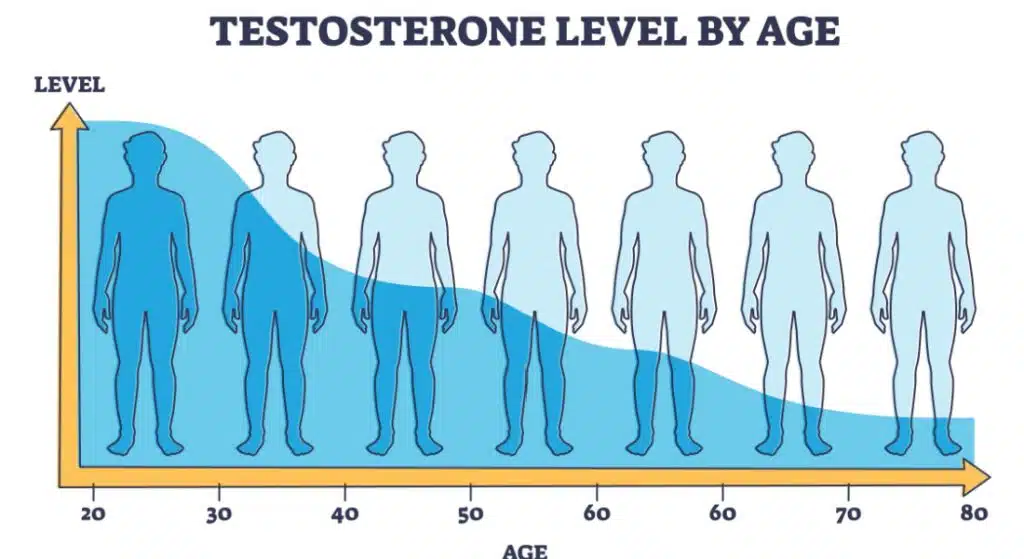Testosterone plays a pivotal role in human health especially for men. It influences everything from energy levels and muscle mass to libido and mood. Many factors affect testosterone levels, but one question often arises: Is testosterone hereditary?
At Winter Park Regenerative Medicine, we help our patients understand the root causes of hormonal imbalances and offer cutting-edge solutions that restore vitality. In this article, we’ll explore the genetic links to testosterone, the other influencing factors, and how you can take control of your health even if your genes don’t offer an ideal starting point.
What Is Testosterone and Why Does It Matter?
To begin with, testosterone is a hormone your body produces in the testicles (for men), and in smaller amounts in the ovaries (for women) and adrenal glands (in both sexes). This hormone belongs to the androgen group and plays several key roles:
- Developing male reproductive tissues
- Building muscle and bone mass
- Regulating sex drive and fertility
- Supporting red blood cell production
- Stabilizing mood and cognitive function
Therefore, low testosterone or “Low T” can drain your energy, lower your mood, reduce libido, and make it harder to build muscle or burn fat.
How Do Genetics Influence Hormones?
Generally speaking, your genetic makeup influences many health aspects—like eye color, metabolism, and susceptibility to certain conditions. Hormone production, including testosterone, is no different. Your DNA contains instructions that determine how your body produces hormones, how it processes them, and how responsive your cells are to them. So yes, testosterone levels have a hereditary component. However, this represents only part of the story. Let’s explore this further.
Is Testosterone Level Inherited?
1. Specific Genes That Influence Testosterone
Researchers have identified specific genes that influence testosterone levels. These include:
- SHBG gene: This gene controls sex hormone-binding globulin, a protein that transports testosterone in the bloodstream. Variants of this gene affect how much free testosterone (the active kind) your body has.
- AR gene (Androgen Receptor): This gene determines how well your body responds to testosterone. Some gene variations may make your cells more or less sensitive to testosterone.
- CYP19A1 gene: This gene helps convert testosterone to estrogen. A highly active version of this gene may cause your body to convert testosterone more quickly, reducing levels.
- LHCGR gene: This gene affects how your body responds to luteinizing hormone, which plays a key role in testosterone production.
Clearly, these genetic traits can predispose someone to lower or higher testosterone levels.
2. What Twin Studies Show Us
Twin studies offer more compelling proof. Researchers who compare identical and fraternal twins have found that genetics can explain up to 65% of the difference in testosterone levels among men. Still, this means that 35% to 45% of your testosterone levels depend on non-genetic factors—like lifestyle, sleep, diet, and physical activity.
What Else Affects Testosterone Levels?
Even if your genes suggest lower testosterone, they don’t seal your fate. In fact, you can significantly improve testosterone levels through healthy choices and proper medical care. Let’s look at the other major factors:
1. Age
As men age, their bodies naturally reduce testosterone production about 1% per year after age 30. However, the speed and severity of this decline vary depending on genetics, lifestyle, and overall health.
2. Body Fat and Obesity
Excess fat especially around the abdomen can increase estrogen levels and suppress testosterone. Additionally, fat tissue raises inflammation, which disrupts hormone balance.
3. Chronic Health Conditions
Conditions like Type 2 diabetes, sleep apnea, and liver disease interfere with testosterone production. If left untreated, these conditions can create a downward spiral in hormonal health.
4. Toxins and Medications
Certain environmental toxins (such as BPA), prescription medications (like opioids or corticosteroids), and alcohol overuse can all damage the body’s ability to produce testosterone effectively.
5. Stress and Cortisol
When you experience chronic stress, your body produces more cortisol a hormone that suppresses testosterone. As a result, stress management is essential for healthy hormone levels.
6. Sleep Deprivation
Your body produces most of its testosterone during deep sleep. When you cut back on rest or suffer from poor sleep quality, your hormone levels drop even if you’re young and otherwise healthy.
Can Genetic Testing Predict Testosterone Levels?
While your family history can provide clues, today’s genetic testing offers clearer, more personalized insights. At Winter Park Regenerative Medicine, we use genetic data to personalize your hormone treatment plan. These tests reveal:
- Whether your genes contribute to low testosterone
- How your body processes and responds to hormones
- Which therapies will work best for your genetic profile
Although genetic testing doesn’t predict every detail of your future health, it gives you a powerful head start in crafting an effective treatment strategy.
When Should You Check Your Testosterone Levels?
If you experience any of the following symptoms, consider getting a testosterone evaluation:
- Low motivation or energy
- Decreased sex drive
- Depression or irritability
- Poor sleep or insomnia
- Difficulty building muscle or burning fat
- Low bone density or strength
At Winter Park Regenerative Medicine, we conduct advanced blood tests that measure not just total testosterone, but also free testosterone, SHBG, and estrogen levels. We use this data to develop a comprehensive, individualized hormone plan for you.
How We Treat Low Testosterone (Whether It’s Genetic or Not)
Regardless of whether your low testosterone comes from genes, lifestyle, or aging, you have powerful treatment options at your fingertips. At Winter Park Regenerative Medicine, we offer a wide range of regenerative therapies that treat the root cause—not just the symptoms.
1. Testosterone Replacement Therapy (TRT)
Our team administers TRT through injections, topical gels, or long-acting pellets. We customize each protocol to meet your specific needs and goals while monitoring your progress closely for safety and results.
2. Peptide Therapy
Peptides are short chains of amino acids that trigger your body’s natural hormone production. This treatment works well for men who want to stimulate testosterone without introducing synthetic hormones.
3. Lifestyle and Nutritional Coaching
Our integrative approach also includes tailored programs for:
- Clean, hormone-supporting nutrition
- Resistance and functional training
- Sleep hygiene optimization
- Stress resilience strategies
- Targeted supplementation
These steps help your body produce and maintain healthy hormone levels naturally.
4. Regenerative Injections: PRP and Stem Cells
In specific cases, we use platelet-rich plasma (PRP) or stem cell therapy to improve tissue health, increase energy, and restore hormonal balance more effectively.
Can You Beat Your Genes?
Yes you absolutely can. Even if you inherit a tendency for low testosterone, you can still achieve optimal levels through modern medicine, healthy habits, and expert guidance. Your genes might set the range, but your choices set the outcome. At Winter Park Regenerative Medicine, we help men take full control of their vitality, confidence, and longevity regardless of what their DNA says.
Final Thoughts
- Yes, testosterone levels can be hereditary, with certain genes playing a major role.
- Genetics may account for up to 65% of testosterone level variations.
- Lifestyle, diet, sleep, and stress strongly influence your testosterone—no matter your genetic makeup.
- Our team at Winter Park Regenerative Medicine offers personalized testing, therapy, and coaching to help you reclaim optimal hormone balance.
Take Charge of Your Testosterone Today:
If you’re ready to stop feeling tired, moody, or less like yourself, now is the time to act. Whether your low testosterone stems from genetics or lifestyle, we have the tools, experience, and passion to help you optimize your hormones and transform your health.
???? Visit us in Winter Park, Florida
???? winterparkregenerativemedicine.com
???? Call now: (321) 972-6833
Let’s unlock your best self, one hormone at a time.



